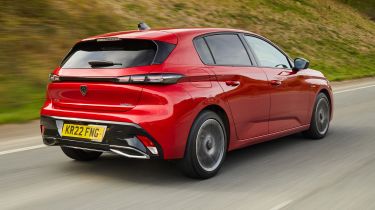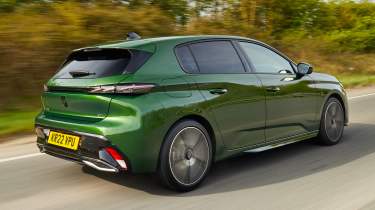Peugeot 308 review - Engines, drive & performance
"The 308 strikes a balance between fun handling and comfort on bumpy roads"
The Peugeot 308 isn’t the most fun car of its type to drive, nor is it the most comfortable, but it falls into a happy middle ground between the two. It’s not as enjoyable on a twisty road as a Ford Focus, nor is it as smooth over a bumpy road as a Skoda Octavia, but it’s comfy and enjoyable enough for almost anyone.
Even our top-spec car on its big 18-inch wheels wasn’t uncomfortable; you could merely feel the state of the tarmac beneath you. Cheaper models come with smaller wheels and more tyre sidewall, so should be slightly softer.
On UK roads, we found it to be more engaging than the latest DS 4, with impressive poise and body control. Its compact steering wheel also makes the car feel agile, with just a flick of the wrist required for most corners. There’s not an awful lot of feel through the wheel, as is the case with many modern cars.
The 308 is smooth at speed on the motorway and the interior stays quiet too, so it’s a good companion for long trips. If you’re only planning to do short journeys, the hybrid version is best as its low-speed electric-only running means it’s very relaxing; it’s ultra-quiet in traffic.
More reviews
We found the brakes to be surprisingly grabby, making it really difficult to slow down or stop smoothly. This was the case when we let the adaptive cruise control adjust the car’s speed, too.
Peugeot 308 petrol engines
Peugeot’s 1.2-litre PureTech three-cylinder petrol engine used to be offered but has since been discontinued and replaced with the mild-hybrid version of the same engine, badged as ‘Hybrid 136’. As well as being more economical, the mild-hybrid gets an increased output of 134bhp thanks to assistance from an electric motor, and a six-speed automatic transmission.
This provides adequate rather than sparkling performance, but feels a little more lethargic than its 9.3-second time suggests. It’s fairly punchy from low revs so you don’t have to rev it too much.
The automatic gearbox is smooth enough for the most part, although at low speeds it can be a little abrupt - though this is also true in the DSG automatic in the VW Golf, SEAT Leon and Skoda Octavia. If you use the manual paddles to override the gearbox, the changes are noticeably quicker than in the Golf. You may want to do that from time-to-time, because in some modes the gearbox holds onto gears for a little too long.
Diesel engines
The 1.5-litre diesel engine has the same 131bhp as the old 1.2-litre petrol, however, 0-62mph takes 10.6 seconds, so it’s not as quick as that car was in a sprint.
The diesel now comes fitted with Peugeot’s eight-speed automatic gearbox as standard. This has quite sluggish shifts in the car’s Eco and Normal driving modes, but Sport sharpens things up quite a bit.
Plug-in hybrid engines
While there were previously two versions of the plug-in hybrid 308 on sale – one with 177bhp and the other with 222bhp – the brand has whittled them down to just one with a power figure in between the two: 193bhp. It’s badged the Plug-in Hybrid 195 and the focus is on electric-only range which has also been improved.
Drive it on purely electric power – say for the average daily commute – and the 308 will transport you in near-silence. This makes it especially relaxing to drive, and it remains quiet even at motorway speeds. Floor the accelerator to speed up, however, and there's a loud and coarse sound when the petrol engine is working hard, which is a shame because the added boost of the electric motor gives the 308 a reasonable turn of speed. Overall, though, the plug-in hybrid model is well worth your consideration.
Electric version
Peugeot produces an electric version of the 308 badged the E-308, which we've reviewed separately. Zero tailpipe emissions mean it sits in the lowest BiK (Benefit-in-Kind) tax bracket for company-car owners, and VED (road tax) is free until 2025. Unfortunately, as every E-308 costs over £40,000, they incur an extra annual fee of £390 for the first five years. The E-308 can do up to 257 miles on a charge of its 54kWh battery.










